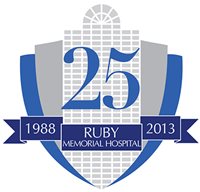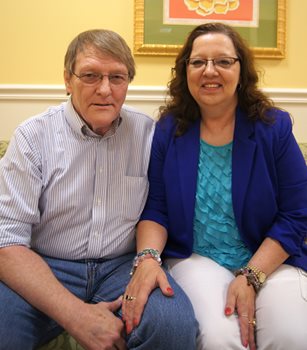Screening program helps detect lung cancer earlier
MORGANTOWN, W.Va. – Over the past 25 years, there have been advancements in diagnosis and treatment for many kinds of cancer. However, until recently the same was not true for lung cancer.
“Until five years ago, I would have said we had made no progress in improving the survival of patients with lung cancer. But in the last five years we have made progress in improving outcomes and survival,” John Parker, M.D., pulmonology specialist at Ruby Memorial Hospital, said.

Effective screening has played a critical role in catching lung cancer in early stages. Dr. Parker, who is also a member of the Sara Crile Allen and James Frederick Allen Comprehensive Lung Cancer Program at the WVU Mary Babb Randolph Cancer Center, said early detection has led to a 20 percent increase in survivability.
Recently, the U.S. Preventive Services Task Force released a draft recommendation that those at high risk for lung cancer receive annual low-dose CT scans.
“This recommendation will hopefully get insurance companies to follow evidence-based guidelines and make lung cancer screening for high-risk patients a covered benefit,” Parker said.
Still, he noted that smokers cannot solely rely on screenings, which is why the WVU Healthcare Lung Cancer Screening Program also offers smoking cessation counseling in addition to the CT scan. The program is a multidisciplinary effort aimed at catching the disease in its early stages. For $99, a patient receives a CT scan and a one-on-one intervention session with a WVU smoking cessation counselor. Free services from the West Virginia Tobacco Quitline are also provided.
“Lung cancer screening doesn’t give license to continue unhealthy behavior. The best prevention is not screening but smoking cessation,” Parker said.
Larry West, 61, smoked for 40 years before quitting about four years ago. West, a Morgantown resident, said it was an accident in his kitchen that brought him to Ruby Memorial last summer.

“I feel lucky. I think it was a miracle that I fell in the kitchen and dislocated my shoulder. I am so lucky that happened because I would have never thought that I had cancer,” he said.
After getting an X-ray, doctors told him they found a nodule and that he would need to go through further screening. West said the nodule turned out to be lung cancer. He underwent surgery in September and is currently cancer free.
He said others shouldn’t rely on luck to get screened for lung cancer.
“If you smoked as long as I have or if you still smoke, you should get screened. It’s an excellent program,” he said. “I’m retired. My wife is retired. We get to enjoy each other now. I could be in the hospital right now instead of out enjoying life.”
West has a follow-up screening this fall, and he said his wife Mary will get screened this year as well.
Currently, the screening program is for patients who are 55 to 74 years old and are either active smokers with at least a 30 pack-year history or have quit smoking within the past 15 years. Pack years are calculated by multiplying the number of packs per day smoked by number of years smoked. Patients must also be referred by a physician.
Patients interested in the program should contact their primary care physician. Once the physician has ordered the screening, they can call 855-WVU-LUNG option 1 for an appointment time.
Physicians seeking more information on the program can contact Kim Yow, R.N., at 304-293-9525 or Christina Ayers, R.N., at 304-293-2288.
WVU Healthcare’s flagship hospital, Ruby Memorial, is celebrating its 25th anniversary. It opened on July 19, 1988, after a generous donation from Morgantown philanthropist Hazel Ruby McQuain. The anniversary celebration will continue through the fall, marking a quarter century of care for tens of thousands of patients.
“Until five years ago, I would have said we had made no progress in improving the survival of patients with lung cancer. But in the last five years we have made progress in improving outcomes and survival,” John Parker, M.D., pulmonology specialist at Ruby Memorial Hospital, said.

Effective screening has played a critical role in catching lung cancer in early stages. Dr. Parker, who is also a member of the Sara Crile Allen and James Frederick Allen Comprehensive Lung Cancer Program at the WVU Mary Babb Randolph Cancer Center, said early detection has led to a 20 percent increase in survivability.
Recently, the U.S. Preventive Services Task Force released a draft recommendation that those at high risk for lung cancer receive annual low-dose CT scans.
“This recommendation will hopefully get insurance companies to follow evidence-based guidelines and make lung cancer screening for high-risk patients a covered benefit,” Parker said.
Still, he noted that smokers cannot solely rely on screenings, which is why the WVU Healthcare Lung Cancer Screening Program also offers smoking cessation counseling in addition to the CT scan. The program is a multidisciplinary effort aimed at catching the disease in its early stages. For $99, a patient receives a CT scan and a one-on-one intervention session with a WVU smoking cessation counselor. Free services from the West Virginia Tobacco Quitline are also provided.
“Lung cancer screening doesn’t give license to continue unhealthy behavior. The best prevention is not screening but smoking cessation,” Parker said.
Larry West, 61, smoked for 40 years before quitting about four years ago. West, a Morgantown resident, said it was an accident in his kitchen that brought him to Ruby Memorial last summer.

“I feel lucky. I think it was a miracle that I fell in the kitchen and dislocated my shoulder. I am so lucky that happened because I would have never thought that I had cancer,” he said.
After getting an X-ray, doctors told him they found a nodule and that he would need to go through further screening. West said the nodule turned out to be lung cancer. He underwent surgery in September and is currently cancer free.
He said others shouldn’t rely on luck to get screened for lung cancer.
“If you smoked as long as I have or if you still smoke, you should get screened. It’s an excellent program,” he said. “I’m retired. My wife is retired. We get to enjoy each other now. I could be in the hospital right now instead of out enjoying life.”
West has a follow-up screening this fall, and he said his wife Mary will get screened this year as well.
Currently, the screening program is for patients who are 55 to 74 years old and are either active smokers with at least a 30 pack-year history or have quit smoking within the past 15 years. Pack years are calculated by multiplying the number of packs per day smoked by number of years smoked. Patients must also be referred by a physician.
Patients interested in the program should contact their primary care physician. Once the physician has ordered the screening, they can call 855-WVU-LUNG option 1 for an appointment time.
Physicians seeking more information on the program can contact Kim Yow, R.N., at 304-293-9525 or Christina Ayers, R.N., at 304-293-2288.
WVU Healthcare’s flagship hospital, Ruby Memorial, is celebrating its 25th anniversary. It opened on July 19, 1988, after a generous donation from Morgantown philanthropist Hazel Ruby McQuain. The anniversary celebration will continue through the fall, marking a quarter century of care for tens of thousands of patients.